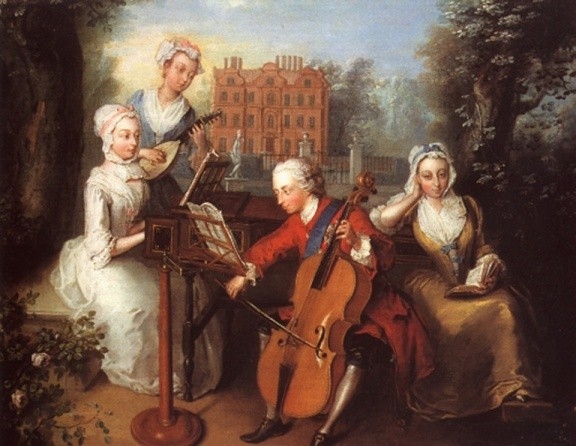

The English ballad opera rose to popularity after the extraordinary success of The Beggar's Opera by John Gay in London in 1728. This piece broadly satirized the fashionable Italian opera; its music, like that of the early opera comique, consisted for the most part of popular tunes—ballads—with a few numbers parodied from familiar operatic airs. The immense popularity of ballad operas in the 1730s was one sign of a general reaction in England against foreign opera, that "exotic and irrational entertainment," as Dr Johnson called it—a reaction which had mong its consequences that of turning Handel from opera to oratorio in the latter part of his life. The most notable composer of English opera in the eighteenth century was Thomas Augustine Arne; many comic operas on sentimental or romantic subjects were produced by him and lesser composers throughout the century.
As far as church music was concerned, the overpowering influence of Handel operated to discourage originality, and the generally low level is relieved only by the works of a few composers such as Maurice Greene and Samuel Wesley. The latter half of the eighteenth century was not by any means a period of musical stagnation in England; there was an active concert life, and much intelligent appreciation of foreign musicians, notably Haydn, who wrote several of his most important symphonies for London audiences. A noted English composer of symphonies was William Boyce, whose symphonies are conservative in form, but fresh and engaging in their melodies and rhythms.
The Composers (and some others)
- Carl Friedrich Abel
- Michael Arne
- Thomas Augustine Arne
- Charles Avison
- Gaetano Besozzi
- Isaac Blackwell
- Capel Bond
- William Boyce
- Charles Burney
- Thomas Chilcot
- William Crotch
- Thomas Alexander Erskine
- Michael Christian Festing
- John Abraham Fisher
- John Forbes
- David Garrick
- Joseph Gibbs
- Maurice Greene
- Sir John Hawkins
- Philip Hayes
- John Hebden
- Pieter Hellendaal
- James Hook
- William Horsley
- William Jackson
- John Keeble
- Thomas Linley, Jr.
- Thomas Linley, Sr.
- Ralph Roseingrave
- Thomas Roseingrave
- Giuseppe (Francesco Gaspare Melchiorre Baldassare) Sammartini
- John Christopher Smith
- John Stanley
- John Travers
Supplemental Materials
Poetry and Prose
Articles